Church-state separation advocates are celebrating that President Donald Trump has not been able to keep his promise “to get rid of and totally destroy the Johnson Amendment.”
This month marks the two-year anniversary of Trump making that vow, which occurred during a speech at the National Prayer Breakfast just two weeks into his term as president.

(PHOTO: President Donald Trump speaking at the 2017 National Prayer Breakfast, during which he promised to “destroy” the Johnson Amendment. CREDIT: Screenshot from C-SPAN.)
However, it wasn’t the first time Trump had threatened the Johnson Amendment. It was almost exactly a year earlier, during his campaign for the presidency, that Trump first publicly took aim at the federal provision that protects the integrity of both our elections and nonprofits, including houses of worship, by ensuring nonprofits don’t endorse or oppose political candidates.
During a February 2016 campaign rally in Texas, Trump described a private meeting with evangelical pastors who allegedly said they wouldn’t endorse him to their congregations due to the law. That prompted Trump to vocally oppose the Johnson Amendment: “Now we’re gonna get rid of that. … That’s one of the first things I want to do. I want to get rid of that, and politically if we use that power, we’re gonna start going go up up up…”
Religious Right leaders who want to boost their own political power and who’ve had unprecedented influence over the Trump White House may advocate for gutting the Johnson Amendment, but they’re at odds with faith leaders across the country. Thousands of faith leaders – not to mention thousands of nonprofits, more than a hundred religious organizations and the majority of Americans – have repeatedly voiced support for the current law.
That explains why the Johnson Amendment remains intact today, despite repeated attempts to repeal and undermine it over the past two years by Trump and his allies in the previously Republican-controlled House of Representatives.
“The Johnson Amendment has broad public support because Americans don’t want to see their houses of worship and charitable nonprofits become tools for partisan politics,” said Rachel Laser, president and CEO of Americans United, during one of the lame-duck Congress’ last-ditch efforts to gut the law in December.
The Johnson Amendment has broad public support because Americans don’t want to see their houses of worship and charitable nonprofits become tools for partisan politics.
~ AU President and CEO Rachel Laser
Recognizing the threat Trump posed to the law, Americans United built a coalition with allied organizations, faith leaders and community activists to raise awareness of the widespread support for the Johnson Amendment and to urge members of Congress to oppose any attempts to undermine it.
Attacks on the law came swiftly and continuously throughout the past two years. In fact, one perennial Johnson Amendment foe introduced repeal legislation on the first day of the new Congress in 2017, several weeks before Trump’s inauguration. Rep. Walter B. Jones (R-N.C.) sponsored a bill to remove the Johnson Amendment provision from the tax code, as he had almost every session of Congress since 2001.
A month later, U.S. Reps. Steve Scalise (R-La.) and Jody Hice (R-Ga.) and U.S. Sen. James Lankford (R-Okla.) introduced the deceptively named “Free Speech Fairness Act” in the House and Senate. These bills would have significantly undermined the Johnson Amendment by allowing nonprofits to endorse or oppose political candidates as long as the endorsements occurred in the course of their usual organizational business and didn’t incur a significant expense – meaning partisan campaign politics could pervade every aspect of a house of worship, from the pastor’s sermons to a church bulletin, website, marquee or email.
But it wasn’t these standalone bills that posed the greatest threat to the Johnson Amendment; indeed, they never gained traction. Rather, it was attempts by House leaders to sneak language gutting the law into spending and tax bills that came the closest to fruition.
In summer 2017, the House inserted language into an appropriations bill that would have made it nearly impossible to enforce the Johnson Amendment – any investigations into possible violations of the law would have required permission from the IRS commissioner, notification to two congressional committees and a 90-day waiting period. The bad Johnson Amendment language made it into the version of the spending bill that was approved by the full House, despite fierce opposition from several members of Congress, including U.S. Reps. Debbie Wasserman Schultz (D-Fla.) and Barbara Lee (D-Calif.), who offered an amendment to remove the language.
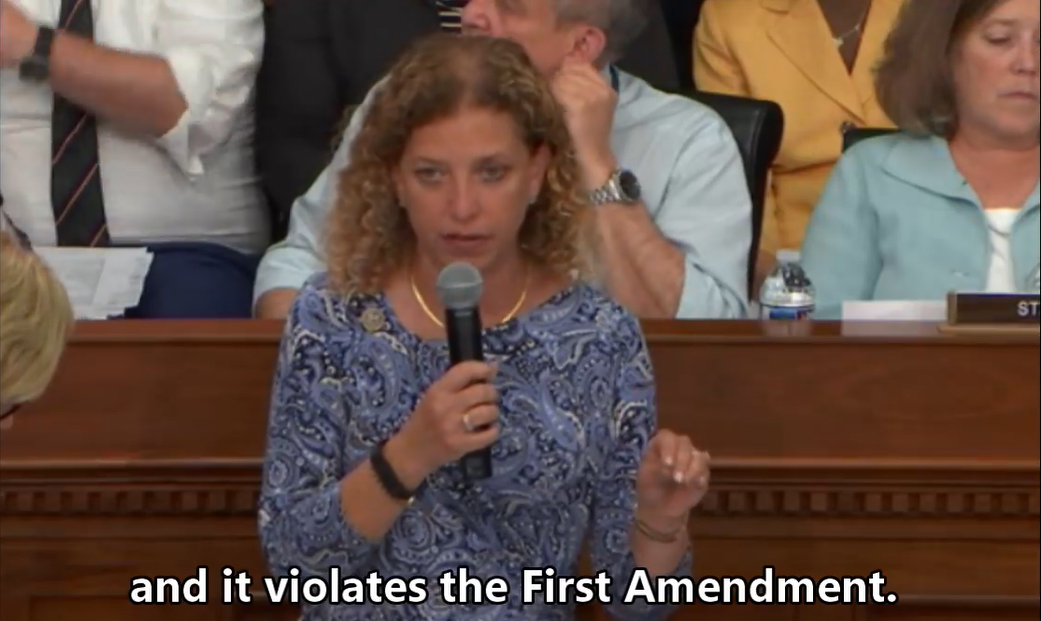
(PHOTO: U.S. Rep. Debbie Wasserman Schultz (D-Fla.) speaking in support of the Johnson Amendment during a 2017 congressional hearing. CREDIT: Wasserman Schultz’s Facebook page.)
Fortunately, the Senate version of the spending bill did not include the harmful Johnson Amendment provision, and Congress ultimately passed short-term, continuing resolutions to keep the government funded because members couldn’t agree on a full-scale funding plan.
Meanwhile, congressional Republicans also were advancing a tax bill in late 2017, formally called the Tax Cuts and Jobs Act. The House version of the tax bill initially included language that would have allowed houses of worship – but not other nonprofits – to endorse or oppose candidates as part of their ordinary business as long as it didn’t cost additional money.
U.S. Rep. John Lewis (D-Ga.), a longtime champion of the Johnson Amendment, led the fight to remove the language. “Churches, synagogues, temples and mosques are houses of worship. Let us keep them that way and not let politics get in the way,” Lewis said during a House committee hearing. “Let us keep a separation of church and state. Keep that wall solid and strong.”
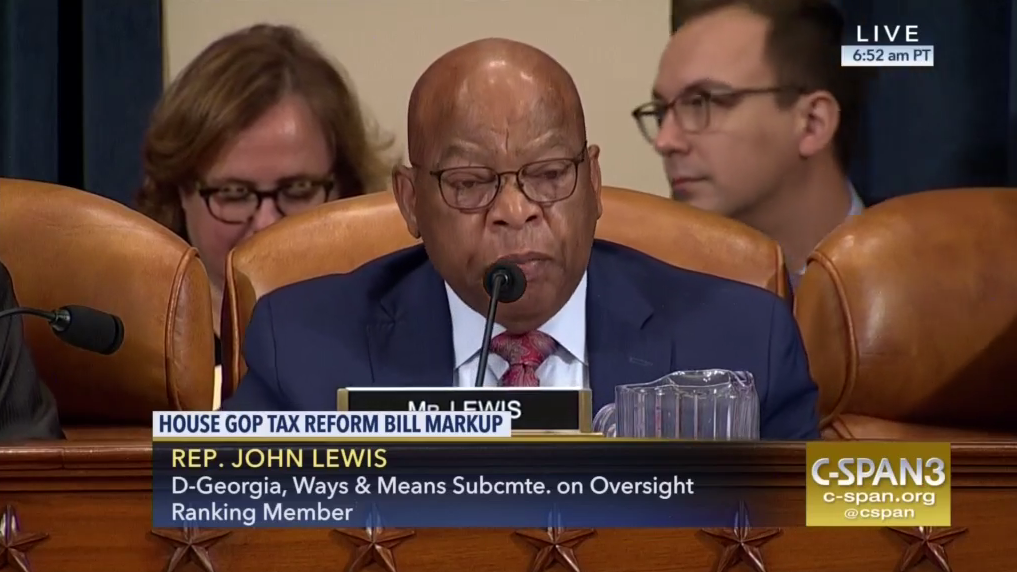
(PHOTO: U.S. Rep. John Lewis (D-Ga.) speaking in support of the Johnson Amendment during a 2017 congressional hearing. CREDIT: Screenshot from C-SPAN.)
Not only did Lewis’ amendment to strip the problematic provision fail, but House Ways and Means Committee Chairman Kevin Brady (R-Texas) expanded the Johnson Amendment language in the tax bill to affect all nonprofits, not just houses of worship. The House approved the version of the tax bill that included Brady’s expanded language. But the Senate version did not, and when the two chambers compromised to craft the final tax bill, the Johnson Amendment language was stripped out shortly before the bill was approved.
In 2018, it was Johnson Amendment déjà vu. The House added language gutting the law to an appropriations bill. Wasserman Schultz and Lee unsuccessfully tried to strip it out. The Senate version of the bill didn’t include the language. At Church & State’s press time, no final spending bill had been approved due to the budget impasse and government shutdown that arose over Trump’s demands to fund his wall along the U.S.-Mexico border. And given the change in leadership in the House, gutting the Johnson Amendment is no longer expected to be a House priority.
Concurrently, House Republicans launched a last-ditch attempt to pass a second tax bill in December, complete with language added by Brady to undermine the Johnson Amendment and another unsuccessful attempt by Lewis to remove it. The Senate never took up tax bill 2.0, the legislation died and the Johnson Amendment lives on.
Since Republicans, who included repealing the Johnson Amendment in their party platform, are no longer in control of the House, advocates of the law and church-state separation are breathing a little easier.
“Our coalition did an incredible job of educating members of Congress and mobilizing people on the ground. Faith leaders, nonprofit organizations, campaign finance advocates and church-state organizations stepped up time and again to protect the Johnson Amendment,” said Maggie Garrett, AU’s vice president of public policy. “And key legislators like Reps. Debbie Wasserman Schultz, Barbara Lee and John Lewis made sure our voices were heard in committee hearings and floor debates.”
Faith leaders especially played a critical role in the campaign to protect the Johnson Amendment. Through the Faith Voices initiative launched by Americans United and allies, more than 4,500 faith leaders nationwide wrote to Congress in support of the law. Their voices were particularly important because Trump and his Religious Right allies try to frame the fight to repeal the Johnson Amendment as something that benefits clergy when quite the opposite is true.
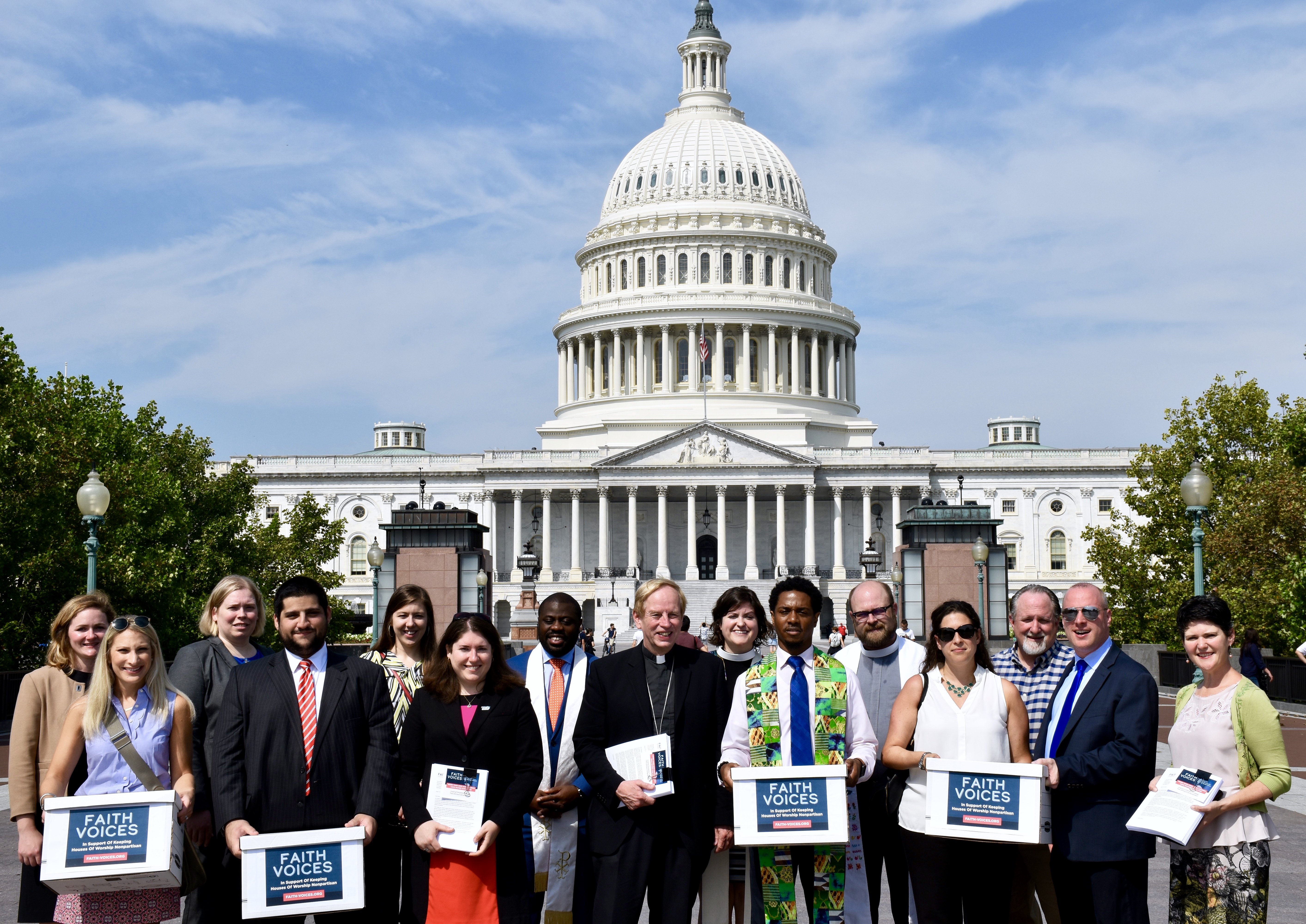
(PHOTO: Faith leaders deliver to Congress more than 4,500 signatures from fellow faith leaders nationwide who support the Johnson Amendment.)
Trump has erroneously couched the Johnson Amendment as a provision that stifles the free speech of faith leaders. He conveniently ignores all the instances of evangelical leaders who publicly endorsed his presidential campaign – including Baptist megachurch pastor Robert Jeffress, who voiced support for Trump at the same Texas rally during which Trump first attacked the law. (Jeffress holds a grudge against the Johnson Amendment – Americans United has twice warned him of past actions that may have run afoul of the law. (See “The Apostle Of Trump,” July/August 2018 issue of Church & State.)
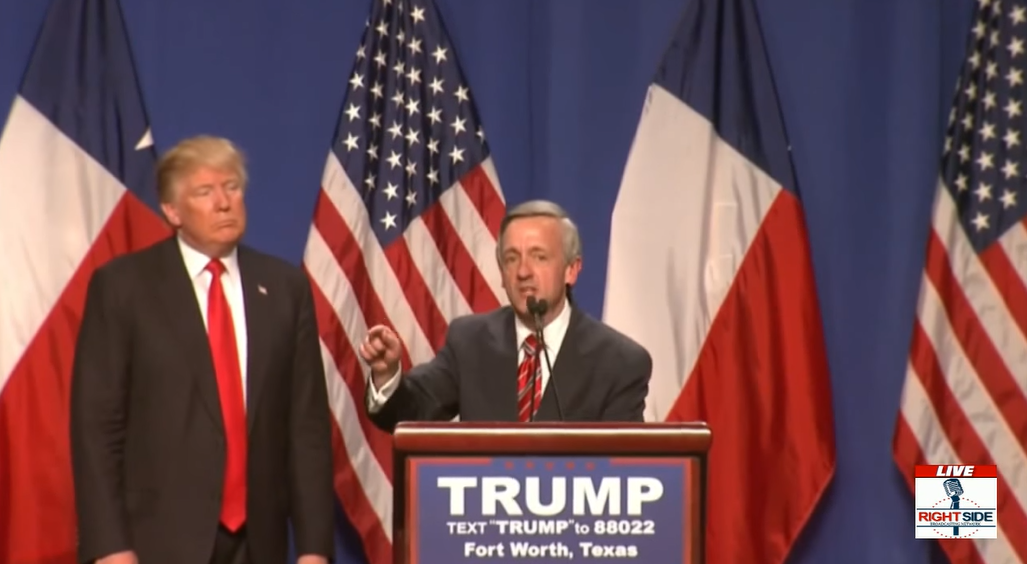
(PHOTO: The Rev. Robert Jeffress support Donald Trump’s presidential campaign during a 2016 campaign rally in Texas. Credit: Screenshot from Right Side Broadcasting.)
Trump and Johnson Amendment detractors either ignore or don’t understand that faith leaders can endorse or oppose political candidates in their individual capacities; they just can’t do so from the pulpit or while acting as representatives of their congregations. Additionally, faith leaders, houses of worship and other nonprofits can speak out on social or political issues. They follow the same rules Americans United does: As a 501 (c)(3) nonprofit, Americans United can’t endorse candidates, but the organization is not constrained from speaking out on political issues that impact church-state separation.
“Houses of worship can take positions on issues of moral, social or political concern; lobby on legislation and endorse or oppose non-partisan referendums; host candidate forums and distribute answers to candidate questionnaires; and encourage people to vote, including through voter registration drives and getting people to the polls,” wrote Margaret Magee, OSF, president and board chair of Franciscan Action Network, and the Rev. Jimmie R. Hawkins, director of the Presbyterian Office of Public Witness, in a joint opinion column for The Hill.
“Repealing the Johnson Amendment would threaten our ability to engage in these practices by introducing undue partisan pressures that would tarnish the moral ground on which we stand,” Magee and Hawkins continued. “Regardless of where we stand on the issues, the Johnson Amendment protects our ability to speak from our faith tradition without fear of partisan entanglement or interference.”
Rabbi Steven Denker of Temple Emanu El in Orange Village, Ohio, wrote in the Cleveland Jewish News that the Johnson Amendment protects clergy and houses of worship from “political blackmail” from members, donors and politicians who could otherwise make demands that the congregation support candidates in exchange for donations, government support of projects or other benefits.
“Some say that [the law] prevents clergy from expressing their political views but, in reality, a significant number of clergy do publicly announce their political preferences, including the endorsement of candidates, without legal repercussions to themselves or their congregations,” Denker said. “This is different than a wise pulpiteer’s self-censorship in order to preserve his or her ability to pastor the entire flock or to keep from losing a job for having replaced messages of faith and social justice with partisan polemics.”
Pastor Garrett Vickrey of Woodland Baptist Church in San Antonio said people of all faiths recognize the benefits of keeping divisive partisanship out of the pews.
“Supporting the Johnson Amendment seems to be one of the few things capable of bringing together people of faith from across the theological spectrum,” Vickrey wrote in the San Antonio Express-News. “People from across the conservative to liberal spectrum seem to understand that the Johnson Amendment is a good thing because it keeps churches from being overly involved in partisan politics.”
Faith leaders strongly feel that houses of worship are sacred spaces and not places for partisan politics.
~ AU Faith Organizer Bill Mefford
“Any time we have needed faith leaders to speak out in support of the Johnson Amendment, I have been amazed – but not surprised – at the tremendous level of response they have shown all across the country,” said Bill Mefford, AU’s faith organizer. “Faith leaders strongly feel that houses of worship are sacred spaces and not places for partisan politics.”
It remains to be seen how Trump will handle Congress’ refusal to “get rid of” the Johnson Amendment. Trump clearly would gut the law himself if he could: On the National Day of Prayer in 2017, Trump issued an executive order that purportedly scaled back IRS enforcement of the law but in actuality didn’t accomplish anything.
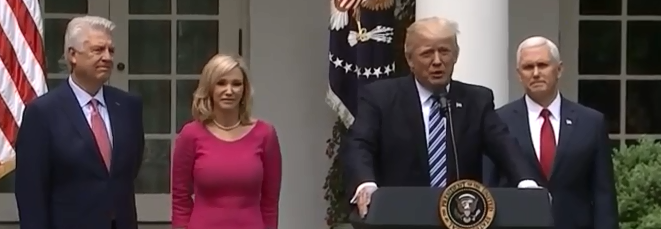
(PHOTO: President Donald Trump attempts to undermine the Johnson Amendment and religious freedom with an executive order issued during the 2017 National Day of Prayer. CREDIT: Screenshot from C-SPAN.)
Later that summer, Trump bragged to Christian Broadcasting Network founder Pat Robertson that he’d “gotten rid of the Johnson Amendment … [because] I signed an executive order so that now people like you that I want to hear from, ministers and preachers and rabbis and whoever it may be, they can speak.” It was a claim rated as “mostly false” by PolitiFact, the Pulitzer Prize-winning fact-checking website.
The Johnson Amendment is a federal law and only Congress can repeal it. Trump’s own Department of Justice had to confess in an August 2017 court filing that Trump’s executive order didn’t do much: “The Order does not exempt religious organization[s] from the restrictions on political campaign activity applicable to all tax-exempt organizations. Rather, the Order directs the Government not to take adverse action against religious organizations that it would not take against other organizations in the enforcement of these restrictions.” In other words, the IRS must treat houses of worship and secular nonprofits the same when enforcing the Johnson Amendment, which it already does.
The National Prayer Breakfast is coming up again this month, and Trump has been the keynote speaker two years running. After launching his crusade against the Johnson Amendment at the breakfast in 2017, he didn’t mention it at last year’s event. But if he again vows to “destroy” the law this year, Americans United and allies will be ready to rally Johnson Amendment supporters once again.


